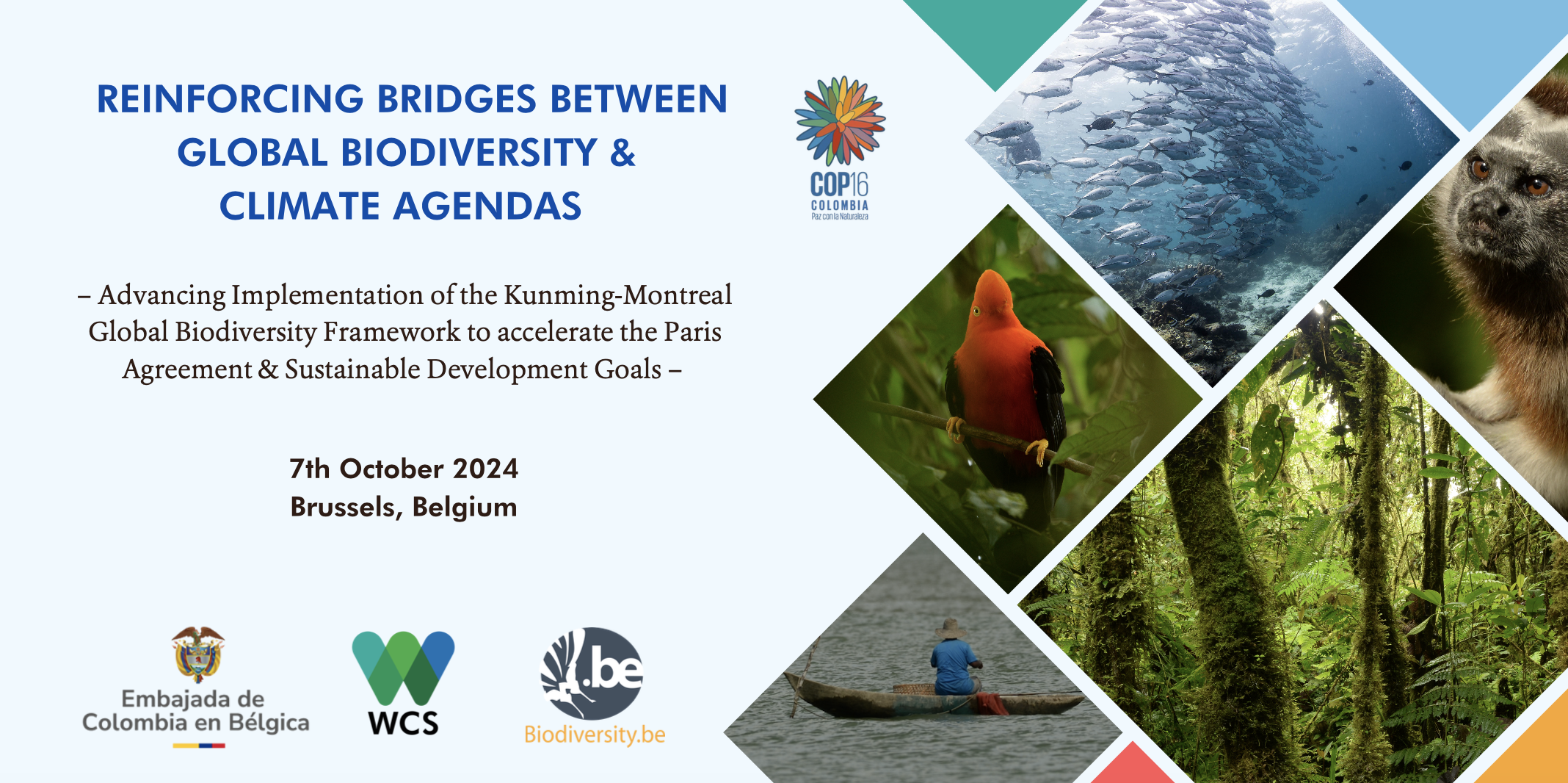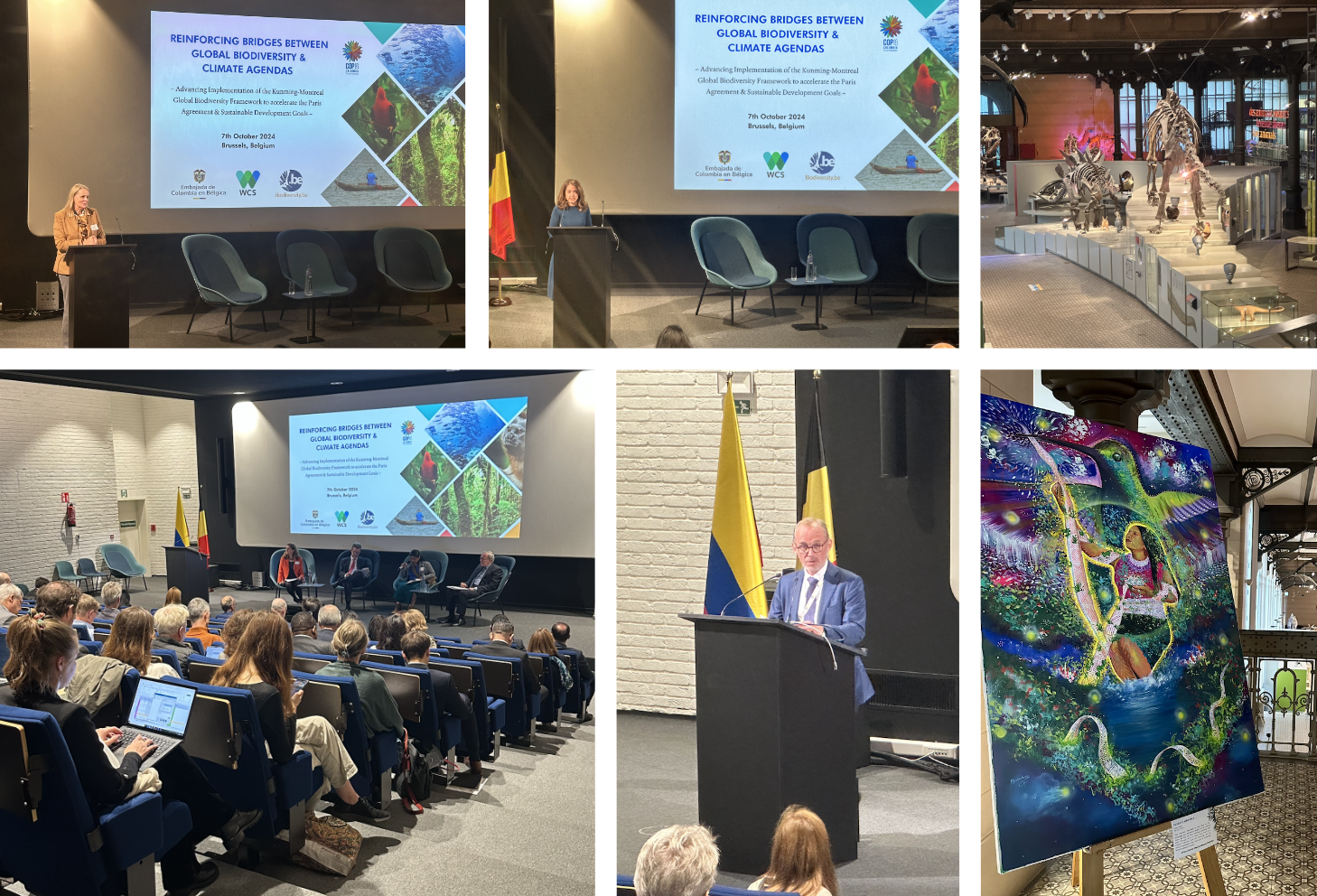
Reception on COP16 and COP29
In the run-up to the sixteenth session of the Conference of the Parties to the Convention on Biological Diversity (CBD COP16) in Cali, Colombia, the Embassy of Colombia in Brussels, the Wildlife Conservation Society EU Office (WCS EU), and the Belgian Biodiversity Platform hosted a special reception on October 7th, 2024, to discuss the integration of global frameworks and international commitments to achieve policy goals and biodiversity gains.
This event aimed to reinforce bridges between the forthcoming United Nations biodiversity and climate summits, providing an opportunity to promote the participation of different stakeholders and to hear from Colombia, a host country, on its priorities for the upcoming COP16. Notably, the event unpacked why achieving climate goals and the Sustainable Development Goals (SDGs) are dependent upon the implementation of the Kunming-Montreal Global Biodiversity Framework (KM-GBF) and explored ways to strengthen synergies between the three Rio conventions on biodiversity conservation, climate change, and combating desertification.
We were joined by honored guest speakers that span national governments from the Global South, the European Commission, and civil society to infuse the discussion with their invaluable perspectives and insights. Following keynote addresses, panelists and the moderator provided brief introductions, followed by an interactive Q&A session. A networking reception and cultural exhibition followed the panel discussion.
 Speakers, the audience, and an art exhibition at the COPs event in Brussels.
Speakers, the audience, and an art exhibition at the COPs event in Brussels.
OPENING REMARKS
Ms. Camila Polo Flórez, Chargé d'Affaires at the Embassy of Colombia in Belgium, emphasized Colombia's government commitment to extend peace and reconciliation to nature to ensure humanity's survival and the planet's future. She stressed the need to tackle climate change and biodiversity as two sides of the same coin. She called to strive with the same determination for decarbonization and a fair energy transition on one side and nature restoration on the other to allow nature to retake its power over the earth to stabilize climate. At COP16, Ms. Polo Flórez called for elevating the political relevance of biodiversity and the Global Biodiversity Framework within the broader environmental agenda. The COP16 must redefine approaches to business and economies, highlight the importance of ecological services, and place human rights at the core of environmental efforts. She also noted that mobilizing domestic, international, public, and private resources along with innovative financing is crucial to halting and reversing biodiversity loss. Ms. Polo Flórez concluded that the involvement of Indigenous Peoples, Afro-descendants, and local communities, with their practical and equitable conservation knowledge, must be central to these efforts.
KEYNOTE ADDRESS
Dr. Florika Fink-Hooijer, Director General of DG Environment at the European Commission, stressed that both biodiversity loss and climate change are interconnected crises, as highlighted by several consecutive scientific reports from IPCC and IPBES. Attempts to tackle these emergencies in isolation will lead to failure on both fronts. She reminded us that nature until now has been our best ally for climate change mitigation and adaptation. Dr. Fink-Hooijer also warned that we are dangerously close to exceeding planetary boundaries, with six of the nine already surpassed. She added that scaling up nature-based solutions are a crucial element of the overall mitigation and adaptation effort in addition to technological and societal solutions. Dr. Fink-Hooijer also emphasised the need to further integrate both climate and biodiversity concerns into policies and legislation and most of all into finance and investment decisions. As we approach CBD COP16, UNFCCC COP29, and UNCCD COP16, she highlighted that the EU and its Member States are steadfast in supporting synergies and collaboration to address climate change, biodiversity loss and land degradation. Dr. Fink-Hooijer concluded that the stakes are high, but success is still within reach.
PANEL DISCUSSION
Dr. Janice Weatherley-Singh, Director, Wildlife Conservation Society EU Office, introduced the speakers and moderated the panel discussion.
H.E. Ambassador Pedro Miguel da Costa e Silva, Head of Mission of Brazil to the EU, highlighted the significance of the upcoming biodiversity and climate COPs taking place in South America, specifically in two Amazonian countries. He stressed that this is a crucial moment to listen to local communities, understand their challenges, and consider their needs and visions for sustainable development. Ambassador da Costa e Silva highlighted that there are many areas where synergies between the Rio Conventions can be found, such as climate adaptation, ecosystem restoration, sustainable water management, low-carbon agriculture, and disaster risk management. In developing countries, it is essential to address hunger and poverty alongside climate, biodiversity, and land management agendas, as these efforts bring environmental, economic, and social benefits to local populations. He also noted Brazil's G20 Presidency proposal to establish a Global Alliance against Hunger and Poverty, elevating this issue to the forefront of international politics. Ambassador da Costa e Silva concluded that adequate funding must be secured for each, and the importance of climate, biodiversity, and sustainable land management must be recognised individually to ensure effective action.
H.E. Ambassador Vaqif Sadıqov, Head of Mission of the Republic of Azerbaijan to the EU, highlighted that the world is facing an array of unprecedented environmental challenges from biodiversity loss and ecosystem degradation to the mounting impacts of climate change. These issues demand urgent, unified action from all of our counties. He stressed the significance of COP16 as a pivotal moment in global efforts to protect biodiversity, adding that while the targets are ambitious, they are achievable through decisive and inclusive action. Ambassador Sadıqov introduced "Water for Climate Action" as one of the key initiatives under the COP19 Presidency, pointing out that water is central to the climate crisis. Billions worldwide face challenges such as droughts, floods, rising sea levels, and shrinking inland waters, which are devastating ecosystems and biodiversity. He referenced the shrinking Caspian Sea in Azerbaijan as an example of how climate change is impacting water resources, ecosystems, and livelihoods. Ambassador Sadıqov concluded with optimism for the success of COP16 in Colombia, expressing confidence that the conference will inspire transformative global action, strengthened partnerships, and decisive steps toward a more sustainable and resilient future.
Ms. Eliana Muchachasoy, Visual Artist from the Camëntsa Indigenous Community in Putumayo, Colombia, emphasised the deep connection between her Indigenous heritage and her artistic journey. "Since childhood, I was taught to give thanks to Mother Earth, the creator of the universe, the sun, the mountains, and our ancestors for all that we receive each day. Gratitude, after all, is also a form of receiving," she explained. For Eliana and her community, visibility is essential. She views it as an opportunity that strengthens her not only as an artist but also as a person, a messenger, and a voice for Indigenous Peoples. Through her work, Eliana represents a millennia-old legacy of love and consciousness. Her art reflects the enduring spirit of her people, who have preserved their culture and survived in their ancestral lands, where nature forms an integral part of their life plan.
CONCLUDING REMARKS
Mr. Peter Wittoeck, Director of Climate Change at Belgium’s Federal Public Service (FPS) Health, Food Chain Safety and Environment, stressed the deep interconnection between climate change and biodiversity loss. Climate change exacerbates biodiversity loss through shifting habitats and extreme weather events, while biodiversity loss diminishes ecosystems’ resilience to climate impacts, both of which severely affect economies and communities. Mr. Wittoeck highlighted the need for stronger cooperation between the Rio Conventions, emphasizing that finance is key to driving action ahead of UNFCCC COP29 in Baku. Belgium views the New Collective Quantified Goal as an opportunity to transform the global economy, ensuring funds flow toward sustainable solutions for climate and biodiversity. For both the climate transition and the conservation and restoration of biodiversity to really take root, it is crucial that we shift the trillions that are available now in the economy to a new and green paradigm, he added. He also underscored the importance of careful planning and ambitious targets, aligning climate and biodiversity efforts through a whole-of-economy, a whole-of-society and a whole-of-government approach. UNFCCC COP29 will be the opportunity for a final call to Parties to submit ambitious Nationally Determined Contributions, well in advance of COP30 in Belém. Mr. Wittoeck concluded by calling for continued dialogue across institutions to address these complex challenges.